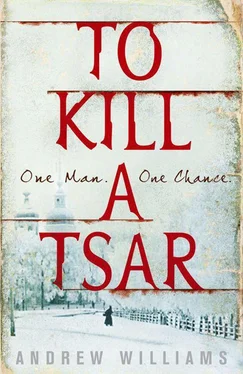‘Damn it, enough of this nonsense!’ said Dobson, throwing his script on to the couch. Both men were dressed for dinner after an expensive evening at the Palkin, although the correspondent had discarded his frock coat ‘the better to perform’. ‘What possessed Hamilton to choose this drivel? And why do I have to play the butler?’
‘Because you’re an inky hack, George,’ Hadfield replied with a tipsy grin. He was slumped in a leather armchair in front of the journalist’s desk, with a glass of brandy in one hand and his lines in the other.
‘You snob, Hadfield. Your egalitarian principles are skin deep, aren’t they?’
‘Grub street reporters are in a class of their own.’
Dobson grunted and turned to pluck the brandy bottle from a silver drinks tray balanced on a table beside the fire.
‘You know, I have it on good authority that Count von Plehve will be at the embassy,’ he said, flopping on to the couch. ‘It will be worth playing a fool if I can inveigle myself into his circle.’
‘Von Plehve?’
‘Don’t you read the papers? He’s the chief prosecutor,’ said Dobson. ‘Tipped to be a government minister in time. And absolutely the man to tell me more about this new nihilist group.’
‘Is there one?’
Lifting a plump thigh on to the couch, the correspondent shuffled round to face Hadfield, his eyes sparkling with interest. ‘Narodnaya Volya. “The People’s Will”. An army friend introduced me to a comrade of his called Barclay, a major in the gendarmes, who told me there was a gathering of revolutionaries in Voronezh last month and the militants — I thought they were all militant but it appears not — the militants have united behind a new banner — “The People’s Will”. Barclay says the police are expecting more outrages. Damn thing is — I can’t print a word of it.’ Dobson shook his head angrily. ‘The bloody censor. When they decide the time is ripe everybody will get it — the Russians, the Germans, even that lazy hack from the Daily Telegraph .’
‘What is the point of cultivating this von Plehve if you can’t print what he says?’
Dobson gave an almost Russian shrug. ‘You never know.’
But the next time Hadfield saw the correspondent he was — to judge from the stream of invective he launched at the wardrobe master — feeling less philosophical about life’s vicissitudes.
‘For God’s sake, man, haven’t you got something that fits?’
The dresser from the Mikhailovsky Theatre was struggling with the butler’s buttons. The drinks tray was close by and Hadfield gestured to it.
‘A stiff nip to help with first and last night nerves? Remember your Count von Plehve is in the audience.’
‘Ha bloody ha, Hadfield.’
The performance was managed with just enough aplomb, and the audience entered into the spirit by applauding buffoonery whether it was intended or not. ‘Wonderfully British,’ the ambassador declared in his vote of thanks. The loudest applause was reserved for the young master of revels, Lord Frederick Hamilton, who had played the part of the fierce grey-haired ‘Countess Gorgonzola’ with great panache.
A light supper was then served in the splendour of the embassy’s White Hall, where Tsar Alexander I had danced the quadrille before meeting his generals to plan the defeat of La Grande Armée. A masterpiece of the Russian baroque in white and gold, fit for the visit of the heir to Byzantium, the tall pier glasses reflected an exuberant plaster tableau of ‘Plenty’.
‘Magnificent,’ said Dobson, gazing at the life-size carvings of Pan’s followers above the frieze. ‘I doubt there is anything to touch it in England.’
‘And a fine view to the Peter and Paul Fortress too,’ said Hadfield, waving his champagne glass at the windows.
‘What a joy you are to be with, old boy. You should have left your socialist baggage at the door. Look,’ he said, nudging Hadfield lightly with his elbow, ‘there’s that wily old bird Gortchakov.’
The grey head of the Russian foreign minister was bent in conversation a few feet from them, peering at the ambassador over his spectacles like an indulgent father. He wore a broad blue sash across his chest and diamond stars on his coat, the glittering honours of twenty years’ service in the courts of Europe.
‘A shocking flirt, you know,’ Hadfield whispered. ‘He likes to know if a new ambassador has a pretty wife. If the answer’s no, then he says the ambassador will fail at court because he’s already lost the most important argument.’
‘Goodness, patients tell their physicians everything, don’t they,’ said Dobson with a cynical little shake of the head. ‘And does he think Lady Dufferin pretty or is your source silent on the subject?’
‘She’s the wife of the British ambassador. Of course he thinks she’s pretty. Don’t you?’
Dobson laughed: ‘You’re wasted in the medical profession.’
‘Quite right. A born actor,’ said Hamilton, stepping up to them with a broad smile. ‘It went swimmingly, don’t you think?’
‘You looked very comfortable in that dress, Your Lordship,’ Dobson replied.
Hamilton inclined his head graciously. The young third secretary was a little effeminate, tall, curly-haired, strikingly handsome and amiable enough, if rather too full of his family connections.
‘A jolly good turnout,’ he declared, with an extravagant flourish to the room. ‘French, German and Italian ambassadors, Baron de Budberg, and over there,’ he nodded discreetly at an elderly gentleman sitting serenely by the window, ‘Prince Davidov — he was educated in Edinburgh. He knew Walter Scott. A little deaf.’
The crème de la crème of summer society drifting with the practised ease of profession and class about the hall. Ladies in black satin dresses and diamonds, the men in a glittering array of court uniforms and frock coats, the murmur of diplomatic French, the clink of champagne flutes and the comfort of a small string orchestra: counts, princes, grand dukes and barons, a timeless display of wealth and privilege. As the third secretary rattled through the names of more guests, Hadfield wondered why a doctor, the son of a doctor, had been invited.
It became clear enough minutes later when Lord Dufferin touched his arm. ‘There’s someone I would like you to meet, Hadfield,’ he said, and led him across the ballroom to where a man with the gold Star of the Order of St Vladimir at his breast was confidently holding forth to a lady.
‘Your Highness, here is the gentleman I was speaking of,’ said Dufferin with a little bow. ‘My wife is adamant he’s the best young doctor in the city.’ And turning to Hadfield: ‘The Princess of Oldenburg and Count von Plehve.’
Hadfield bent low over the gloved hand the princess offered him then gave a stiff bow to the count.
‘Lord Dufferin tells me you’re a nephew of General Glen’s,’ the princess said with a patronising little smile. She was rather a plain woman of middle years, but there was a rich confidence in her manner, her poise, the way she held her head, that a man might find fascinating, even attractive. She was dressed in a fashionable Parisian gown boldly cut off the shoulders.
‘Of course the count knows your uncle too,’ she said, turning to von Plehve. The chief prosecutor inclined his head a little by way of affirmation, scrutinising Hadfield carefully.
‘The count was just telling me of these madmen…’
‘And mad women, Eugénie Maximiliovna…’
‘Yes, mad women too,’ said the princess with a little laugh. ‘Poor Madame Volkonsky, what will become of her?’
The count stroked his moustache thoughtfully with his forefinger. ‘Women are such dangerous creatures, Eugénie Maximiliovna. So much more dangerous than men, don’t you agree, Your Excellency?’
Читать дальше












